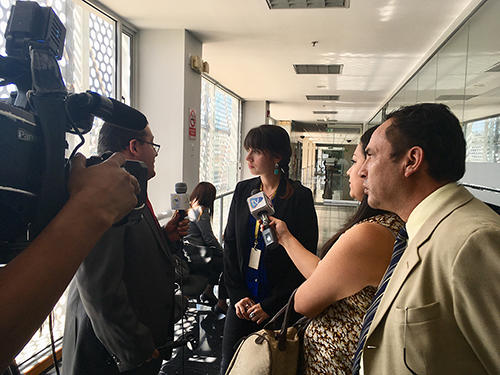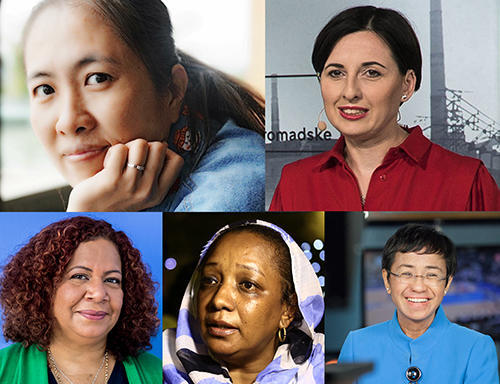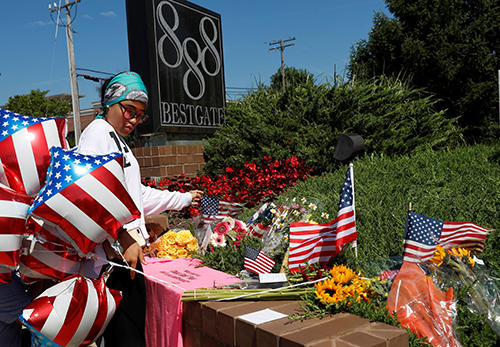The murders represented the single deadliest attack on the U.S. media in recent history.
In an editorial published a few days after the murders, journalists from the Capital Gazette thanked their readers and the wider community for their outpouring of support. “We bring values and beliefs to our work. We believe in truth. We believe in speaking for those who don’t have the power to speak for themselves. We believe in questioning authority. We believe in reporting the news. … We are your neighbors, your friends. We are you.”
CPJ mourns the loss of Capital Gazette editorial page editor Gerald Fischman, editor and columnist Rob Hiaasen, sports writer John McNamara, community correspondent Wendi Winters, and sales assistant Rebecca Smith. “This is a time for everyone who values journalists to stand together and recognize the vital role they play in keeping the public informed,” CPJ Executive Director Joel Simon said.
CPJ launches special report on press freedom in Ecuador

In July, CPJ launched a special report, “The U-turn: Moreno steers Ecuador away from Correa’s media repression,” at a press conference in Quito. The report followed a mission CPJ conducted to Ecuador in March in which we found that President Lenín Moreno’s administration has dramatically diverged from that of his predecessor, Rafael Correa. Still, the Ecuadoran press remains cautious as it waits for change.
CPJ Insider spoke to CPJ South & Central Americas Program Coordinator Natalie Southwick to learn more about the report and its launch.
You visited Ecuador in March. Tell me about the trip.
The purpose of our mission in March was to do on-the-ground research and reporting, and our goal was always to write a report based on our findings. We had heard that the media environment in Ecuador was changing with the new government of Lenín Moreno, but we didn’t know exactly what those changes were or how journalists there felt about it, so we wanted to speak with them and find out more.
We found that the climate for the press has become more open, but that major steps are still needed to ensure journalists are able to work safely and to rebuild a healthy and vibrant independent media.
Did you observe any changes in the media landscape from when you were there last?
One significant change we noticed is that there is much more of a public discussion about journalist safety and security. That wasn’t really happening before, at least not anywhere outside of the journalist community. It’s clearly a reaction to the tragic case of Juan Javier Ortega Reyes, Paúl Rivas Bravo, and Efraín Segarra Abril, the reporting team from El Comercio newspaper who were kidnapped by an armed group in April while reporting near the border with Colombia and later killed.
We have been in contact with their family members and colleagues, who want to ensure that the loss of their loved ones catalyzes a national conversation about how to keep journalists in Ecuador safe so that something like this never happens again. I think we’re seeing that taking place right now.
Beyond that, it’s tough to measure major change over a four-month period, especially when we know the process of rebuilding independent media in Ecuador is going to be a long one. Still, we’re encouraged to see that efforts to reform the country’s repressive Communications Law are moving ahead, and we hope to see those reforms pass before the end of the year. We also hope the upcoming visit of the Special Rapporteurs for Freedom of Expression from the OAS and UN, Edison Lanza and David Kaye, will help that process move along. It’s worth pointing out that this visit would never have happened under the previous administration, so that alone is a major sign of progress.
Tell me a bit about the report’s launch.
This visit was shorter and more targeted than our mission in March. CPJ’s program director, Carlos Martínez de la Serna, and I spent a few days in Quito to follow up on some of our meetings from March and to launch the report. We felt it was important to go back there for the launch so that our contacts and the Ecuadoran press had the first opportunity to cover it and engage with us directly about it. The report launch was on July 12 at the offices of Fundamedios, an Ecuadoran press freedom organization.
What does the report suggest Moreno do next?
The report contains recommendations for several different groups, including the Ecuadoran government as well as Twitter, about which a number of journalists raised concerns.
The first, most immediate, recommendation for Ecuadoran authorities is to work quickly to pass comprehensive reforms to the Communications Law, which still remains on the books and poses a threat to journalists and media outlets across the country. Beyond that, we encourage the government to allow more open access to information and to cooperate with the Inter-American Commission on Human Rights as it looks into the events surrounding the kidnapping and killing of the El Comercio team. Ultimately, we hope the administration will take action to repeal the Communications Law entirely, but that’s a longer-term goal.
What do you plan to do next?
We’ll continue to monitor press freedom conditions in Ecuador to see how much the government’s actions match its rhetoric. So far, the administration has taken positive steps toward creating a freer media environment, but there’s a long way to go–so we want to make sure that progress continues and turns into concrete actions.
We will stay in close contact with our local partners and journalists based there and support efforts to improve safety for reporters across the country. And we will keep advocating for justice in the El Comercio case for as long as we need to.
Congolese editor Ghys Fortuné Dombé Bemba freed
For nearly 18 months, Ghys Fortuné Dombé Bemba languished in a jail in Brazzaville.
Bemba, editor of the privately owned newspaper Talassa, was arrested in January 2017. He was accused of “complicity in undermining state security” in connection with a pastor and former rebel leader whom the government has accused of terrorism. News outlets said Bemba had published a statement by the individual that was critical of the military.
CPJ published stories about Bemba’s imprisonment and, in September 2017, we joined Reporters Sans Frontières to publish a joint letter to Congolese President Sassou Nguesso calling for Bemba’s release. We also included Bemba in our 2018 #FreeThePress campaign, in which more than 100 people wrote personalized postcards to him.
Bemba was released from prison without charge on July 3, one day after a Congolese appeals court ordered that he be freed.
Join CPJ at our 2018 International Press Freedom Awards dinner!

CPJ is holding its 28th annual International Press Freedom Awards dinner on November 20 in New York. The dinner will be hosted by Bill Whitaker, CBS journalist and “60 Minutes” correspondent. The dinner chair is Meher Tatna, president of the Hollywood Foreign Press Association.
CPJ is honoring Amal Khalifa Idris Habbani, a Sudanese freelance journalist and contributor to the news outlet Al-Taghyeer; Nguyen Ngoc Nhu Quynh, an imprisoned Vietnamese blogger known best by her penname “Mother Mushroom”; Luz Mely Reyes, an investigative reporter and co-founder of the Venezuelan news website Efecto Cocuyo; and Anastasiya Stanko, a broadcast journalist and member of Ukraine’s “Stop censorship” movement.
Maria Ressa will be honored with CPJ’s Gwen Ifill Press Freedom Award. Ressa is the founder, CEO, and executive editor of the Philippine news website Rappler. The award honors the memory of Gwen Ifill, the CPJ senior adviser and former board member who died in late 2016. It is awarded to individuals who have exhibited extraordinary and sustained achievement in press freedom.
The 2018 International Press Freedom Awards dinner will be held at the Grand Hyatt in New York. The reception will begin at 6:30 p.m., and dinner will be served at 7:45 p.m. The event is black tie.
For more information, call Buckley Hall Events at (914) 579-1000 or CPJ’s development office at (212) 300-9021, or email [email protected].
Must-reads in July
In late July, CPJ wrote an open letter to Federica Mogherini, high representative of the EU for foreign affairs and security policy, to seek assistance of EU member states in helping to provide a safe haven for the scores of journalists trapped in Syria. CPJ has been in contact with a range of governments about accepting the journalists and their families as refugees and are calling for international cooperation with Israel, Jordan, and Turkey to help provide safe passage for the journalists.
In a story published shortly after he traveled to the Philippines, CPJ Senior Southeast Asia Representative Shawn Crispin wrote that journalists had told him that the Philippine government is using a triple-pronged approach–verbal assaults, social media attacks, and threats to withdraw licenses–to intimidate press reporting on sensitive issues. The news website Rappler has especially been targeted by the government in recent months.
In a blog post published in mid-July, CPJ’s James W. Foley fellow, Lucy Westcott, documented the harassment of female journalists covering the World Cup games. The journalists who spoke to Westcott said the experiences of four reporters who were groped or harassed on the air highlighted the harassment they face on a daily basis.
CPJ in the news
“After Annapolis, a new sense of anxiety sweeps the nation’s newsrooms,” The Washington Post
“For local newspapers, angry readers are a given. But killings send shivers,” The New York Times
“Even when threatened we’ll keep doing our job,” Capital Journal
“How rare are attacks on journalists,” NPR
“Trump’s ‘fake news’ rhetoric crops up around the globe,” Politico
“Deaths of Slovak and Maltese journalists have ‘cast dark shadow’ over press freedom in Europe…,” Press Gazette
“‘Environment of fear’ undermines Pakistan’s electoral process, CPJ warns,” Radio Free Europe/Radio Liberty
“No politicians interrogated over Daphne murder–police inspector,” Times of Malta
“‘Fake news’ becomes tool of repression after Egypt passes new law,” The Guardian
